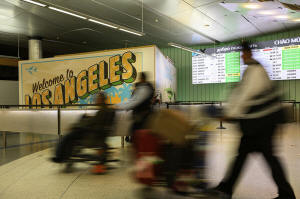Trump's new travel ban takes effect as tensions escalate over
immigration enforcement
[June 09, 2025]
WASHINGTON (AP) — President Donald Trump's new ban on
travel to the U.S. by citizens from 12 mainly African and Middle Eastern
countries took effect Monday amid rising tension over the president's
escalating campaign of immigration enforcement.
The new proclamation, which Trump signed last week, applies to citizens
of Afghanistan, Myanmar, Chad, the Republic of Congo, Equatorial Guinea,
Eritrea, Haiti, Iran, Libya, Somalia, Sudan and Yemen. It also imposes
heightened restrictions on people from Burundi, Cuba, Laos, Sierra
Leone, Togo, Turkmenistan and Venezuela who are outside the U.S. and
don’t hold a valid visa.
The new ban does not revoke visas previously issued to people from
countries on the list, according to guidance issued Friday to all U.S.
diplomatic missions. However, unless an applicant meets narrow criteria
for an exemption to the ban, his or her application will be rejected
starting Monday. Travelers with previously issued visas should still be
able to enter the U.S. even after the ban takes effect.
During Trump’s first term, a hastily written executive order ordering
the denial of entry to citizens of mainly Muslim countries created chaos
at numerous airports and other ports of entry, prompting successful
legal challenges and major revisions to the policy.
No such disruption was immediately discernible at Los Angeles
International Airport in the hours after the new ban took effect.
Haitian-American Elvanise Louis-Juste, who was at the airport earlier
Sunday in Newark, New Jersey, awaiting a flight to her home state of
Florida, said many Haitians wanting to come to the U.S. are simply
seeking to escape violence and unrest.

“I have family in Haiti, so it’s pretty upsetting to see and hear,”
Louis-Juste, 23, said of the travel ban. “I don’t think it’s a good
thing. I think it’s very upsetting.”
Many immigration experts say the new ban is more carefully crafted and
appears designed to beat court challenges that hampered the first by
focusing on the visa application process.
[to top of second column]
|

Travelers push their luggage through the international arrivals area
at the Los Angeles International Airport in Los Angeles, Saturday,
June 8, 2025. (AP Photo/William Liang)

Trump said this time that some countries had “deficient” screening
for passports and other public documents or have historically
refused to take back their own citizens. He relied extensively on an
annual Homeland Security report of people who remain in the U.S.
after their visas expired.
Measuring overstay rates has challenged experts for decades, but the
government has made a limited attempt annually since 2016. Trump’s
proclamation cites overstay rates for eight of the 12 banned
countries.
Trump also tied the new ban to a terrorist attack in Boulder,
Colorado, saying it underscored the dangers posed by some visitors
who overstay visas. U.S. officials say the man charged in the attack
overstayed a tourist visa. He is from Egypt, a country that is not
on Trump’s restricted list.
The ban was quickly denounced by groups that provide aid and
resettlement help to refugees.
“This policy is not about national security — it is about sowing
division and vilifying communities that are seeking safety and
opportunity in the United States,” said Abby Maxman, president of
Oxfam America, a nonprofit international relief organization.
The inclusion of Afghanistan angered some supporters who have worked
to resettle its people. The ban does make exceptions for Afghans on
Special Immigrant Visas, generally people who worked most closely
with the U.S. government during the two-decade-long war there.
Afghanistan had been one of the largest sources of resettled
refugees, with about 14,000 arrivals in a 12-month period through
September 2024. Trump suspended refugee resettlement his first day
in office.
All contents © copyright 2025 Associated Press. All rights reserved |